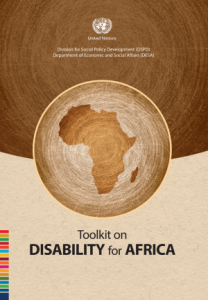Chapter Two: The Convention in detail
- Main page: Handbook for Parliamentarians
- Historical developments leading to a new convention
- The Convention at a glance
- The rights and principles enumerated in the Convention
- Obligations of States parties under the Convention
- Comparing the Convention to other human rights treaties
COMPARING THE CONVENTION TO OTHER HUMAN RIGHTS TREATIES
The Convention complements the other international human rights treaties. It does not recognize any new human rights for persons with disabilities, but rather clarifies States’ obligations to respect and ensure the equal enjoyment of human rights by persons with disabilities.
International human rights instruments that were adopted after the Universal Declaration of Human Rights, the International Covenant on Economic, Social and Cultural Rights, and the International Covenant on Civil and Political Rights clarified the steps that States must take in order to ensure that these rights are respected in particular situations. There are, for example, treaties that specifically protect children or migrant workers and their families, that prohibit torture, or that protect against discrimination on the basis of sex or race. The new Convention focuses on the steps that States must take to ensure that the human rights of persons with disabilities are respected.
The box on page 22 illustrates how the new Convention takes one right that was introduced in the International Covenant on Civil and Political Rights—the right to equal protection before the law—and expands and elaborates on it, focusing specifically on persons with disabilities. The right to equal recognition before the law is fundamental, not only as a right in itself, but as a prerequisite to the full enjoyment of other rights, since only with recognition before the law can rights be protected through the courts (the right to a remedy), can an individual enter into contracts (right to work, among others), buy and sell property (the right to own property alone as well as in association with others), and marry (the right to marry and found a family).
Persons with disabilities have too often been denied the right to equal recognition before the law simply because of the existence of a disability. Some persons with disabilities have not been registered at birth and some persons with disabilities have had their legal capacity completely, and unnecessarily, transferred to guardians who have abused the rights of the person. To remedy this situation, the Convention explicitly describes the content of the right and the steps that States must take to ensure that this right is not violated.
EQUAL RECOGNITION BEFORE THE LAW: THE ELABORATION OF A PRINCIPLE
The International Covenant on Civil and Political Rights (art.16)
Everyone shall have the right to recognition everywhere as a person before the law.
The Convention on the Rights of Persons with Disabilities (art.12)
States Parties reaffirm that persons with disabilities have the right to recognition everywhere as persons before the law.
States Parties shall recognize that persons with disabilities enjoy legal capacity on an equal basis with others in all aspects of life.
States Parties shall take appropriate measures to provide to persons with disabilities access to the support they may require in exercising their legal capacity.
States Parties shall ensure that all measures that relate to the exercise of legal capacity provide for appropriate and effective safeguards to prevent abuse in accordance with international human rights law. Such safeguards shall ensure that measures relating to the exercise of legal capacity respect the rights, will and preferences of the person, are free of conflict of interest and undue influence, are proportional and tailored to the person’s circumstances, apply for the shortest time possible, and are subject to regular review by a competent, independent and impartial authority or judicial body. The safeguards shall be proportional to the degree to which such measures affect the person’s rights and interests.
Subject to the provisions of this article, States Parties shall take all appropriate and effective measures to ensure the equal right of persons with disabilities to own or inherit property, to control their own financial affairs and to have equal access to bank loans, mortgages and other forms of financial credit, and shall ensure that persons with disabilities are not arbitrarily deprived of their property.
Personally, as a woman with a disability, just like other women with disabilities from developing countries, we suffer triple discrimination on account of our disability, our gender and our poverty, so this Convention is going to be very helpful in making sure we enjoy our rights the same way other people enjoy their rights.
Venus Ilagan, Disabled Peoples’ International (Philippines)
CHECKLIST FOR PARLIAMENTARIANS
How I can raise awareness about the Convention’s main principles
- Raise issues relating to the Convention in parliament.
- Review draft legislation to assess conformity with the Convention.
- Liaise with civil society groups, including organizations representing persons with disabilities and human rights organizations.
- Discuss the Convention in meetings and visits to local electorates, local schools, in party meetings, etc.
- Discuss the Convention in speeches to public gatherings, particularly on the International Day for Disabled Persons (3 December).
- Organize meetings with parliamentarians to discuss the Convention.
- Organize television and radio interviews on the Convention.
- Write articles on the Convention for newspapers, journals, magazines and other publications.
- Request that the Convention is translated into national language(s) and is widely distributed.
- Request that the Convention is available in accessible formats.
- Ensure that parliament adheres to the Convention with respect to its members and staff with disabilities.
- Advocate for the establishment of a parliamentary committee on human rights and disability, which could have a role in monitoring the Convention, and ensure that other parliamentary committees consider issues related to disability.
- Ensure that every Member of Parliament has a copy of the Convention and Optional Protocol.
- Promote the Convention and Optional Protocol in your political work, especially in your constituency.
- Hold parliamentary hearings on the rights of persons with disabilities.
Next – Chapter Three: Monitoring the Convention and the Optional Protocol




